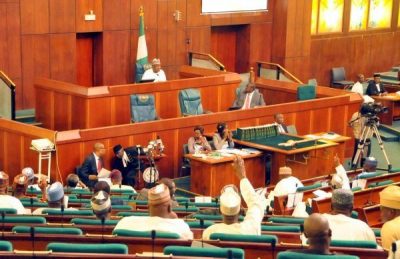
Related Posts
THE House of Representatives, yesterday, moved to change Nigeria’s Presidential system to parliamentary system to save cost of governance, with a bill to that effect scaling first reading.
The bill, which was promoted by 71 members of the House, cuts across party divides.
Immediately after its passage, the 71 lawmakers addressed the newsmen, stating reasons why Nigerians should jettison the presidential system of government and embrace that of the parliamentary system.
Ossai Nicholas Ossai (PDP, Delta), who spoke on behalf of the 71 lawmakers, said: “Our position in this legislation clearly points to compelling advantages of parliamentary systems of government to economic growth and development.
“Studies have shown that countries run by presidential regimes consistently produce lower output growth and more volatile inflation. Political and economic instability also pervades and there are countless empirical records, which show that output growth under presidential regimes is in zero point (negative).
“While out growth under Parliamentary systems clocks from one point and above (positive), in countries run by presidential systems, inflation is on average six percentage point higher than those under parliamentary regimes.
“Income inequality under presidential systems is worse when compared with that of parliamentary or hybrid systems of government. Presidential regimes consistently produce less favourable macroeconomic outcomes which prevails in a wide range of circumstances (The Nigerian example).
“Due to the excessive powers domiciled in one man under the presidential systems, consensus building that is often required for economic decision is always lacking. Economies of nations are known to thrive on the confidence of investors to the system and character of the government.
“The level of instability and volatility of presidential systems makes it difficult to achieve these economic objectives.
“The over centralisation of government decisions that are prevalent in presidential systems obstructs economic development when compared to the parliamentary or hybrid systems.
“The point has also been made to the powerful nature of the presidential office, which often leads to greater fluctuations in the economy with the change of office. This was witnessed in Nigeria in 2015 and currently being experienced as we prepare for 2019 elections.
“Such volatility is evidenced by sharper electoral cycles under presidential regimes than that of parliamentary systems.
As Presidential regimes are often not conducive to consensus building which is known to have favourable effects on the economy.
“Parliamentary systems help in quick passage of economic bills due to the fusion of power that it embodies.”
Rep Tahir Monguno (APC, Borno), Abdulrahman Dasuki (PDP, Sokoto), and others spoke in the same vein supporting the bill to change government system in Nigeria. (Vanguard)
The bill, which was promoted by 71 members of the House, cuts across party divides.
Immediately after its passage, the 71 lawmakers addressed the newsmen, stating reasons why Nigerians should jettison the presidential system of government and embrace that of the parliamentary system.
Ossai Nicholas Ossai (PDP, Delta), who spoke on behalf of the 71 lawmakers, said: “Our position in this legislation clearly points to compelling advantages of parliamentary systems of government to economic growth and development.
“Studies have shown that countries run by presidential regimes consistently produce lower output growth and more volatile inflation. Political and economic instability also pervades and there are countless empirical records, which show that output growth under presidential regimes is in zero point (negative).
“While out growth under Parliamentary systems clocks from one point and above (positive), in countries run by presidential systems, inflation is on average six percentage point higher than those under parliamentary regimes.
“Income inequality under presidential systems is worse when compared with that of parliamentary or hybrid systems of government. Presidential regimes consistently produce less favourable macroeconomic outcomes which prevails in a wide range of circumstances (The Nigerian example).
“Due to the excessive powers domiciled in one man under the presidential systems, consensus building that is often required for economic decision is always lacking. Economies of nations are known to thrive on the confidence of investors to the system and character of the government.
“The level of instability and volatility of presidential systems makes it difficult to achieve these economic objectives.
“The over centralisation of government decisions that are prevalent in presidential systems obstructs economic development when compared to the parliamentary or hybrid systems.
“The point has also been made to the powerful nature of the presidential office, which often leads to greater fluctuations in the economy with the change of office. This was witnessed in Nigeria in 2015 and currently being experienced as we prepare for 2019 elections.
“Such volatility is evidenced by sharper electoral cycles under presidential regimes than that of parliamentary systems.
As Presidential regimes are often not conducive to consensus building which is known to have favourable effects on the economy.
“Parliamentary systems help in quick passage of economic bills due to the fusion of power that it embodies.”
Rep Tahir Monguno (APC, Borno), Abdulrahman Dasuki (PDP, Sokoto), and others spoke in the same vein supporting the bill to change government system in Nigeria. (Vanguard)

